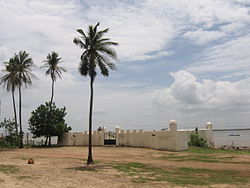
Cacheu is a small city of 10,000 people in northwestern Guinea-Bissau. Notable buildings in Cacheu include the Portuguese-built 16th century fort, dating from the period when Cacheu was a centre for the slave trade.
Understand
editThe town of Cacheu is in territory of the Papel people. The name is of Bainuk origin: "i.e. Caticheu, meaning 'the place where we rest'."
Founded in 1588, Cacheu was one of the earliest European colonial settlements in sub-saharan Africa, due to its strategic location on the Cacheu river. Cacheu developed a European/Afro-European population from the late fifteenth century through informal settlement of Cape Verdian and Portuguese traders, adventurers and outcasts (lançados). The authorities in mainland Portugal also sent to Cacheu degredados - people condemned to exile for a variety of offences.
For most of the 17th and 18th centuries, Cacheu was the official slave trading point for the Portuguese in the Upper Guinea region - the point at which the Portuguese crown endeavoured to ensure that duties on all slaves exported were paid.
Get in
editWith public transport from Bissau, take a sept-place to Canchungo, then change to another for Cacheu. Roads have been renovated in 2007 and are in very good condition.
It should be possible to take a canoa from Cacheu to São Domingos, not on Sundays however, unless you pay for the whole canoa yourself.
Get around
editTarrafe natural park can be visited by canoa. Regural (non tourist) canoa trips to Sao Domingos leave everyday around 10:00 (may vary with sea level) from the harbour (less than €3 as in 2008). It is possible to have lunch at Sao Domingos and return in the same day. If you want a customized trip talk directly with the fishermen.
"Tabancas", small villages around Cacheu, can be visited with local guides.
See
edit
- Tarafes de Cacheu Natural Park
- The little picturesque fort was used to ship slaves to the Americas. There are some old bronze statues inside the fort. If the door is locked, ask around, the friendly guy who has the key lives close-by.

- 1 Memorial da Escravatura e do Tráfico Negreiro (Memorial to Slavery and Trafficking of Black People), Casa Gouveia on the city's waterfront. The memorial collection includes various objects such as iron sticks, whips, pots, chains and metals used to mark slaves.
Do
editVisit the cultural centre "Casa do Capitao Mor" created in collaboration with "Associacao de Cooperacao com a Guinea-Bissau" (Portugal)
Buy
editThe Catholic mission sells local fruit jams to fund medical and health care activities among children.
Eat
editThere are some small restaurants at the harbour, serving rice with something - but probably only open for lunch. Otherwise you'll have to buy bread and canned food and cater for yourself.
Drink
editThe nightclub "Butu de Cacheu" is the only place to drink, dance and listen to African music.
Sleep
editBungalows next to the harbour are reasonably clean and not expensive. The hotel next to the fort was being renovated in 2007 and ought to open some time soon. Otherwise, ask around in town and someone will probably know someone, who can arrange accommodation.
Alternatively, take a car back to Canchungo or Bissau and spend the night there, there are better hotels and restaurants in Canchungo than Cacheu.
